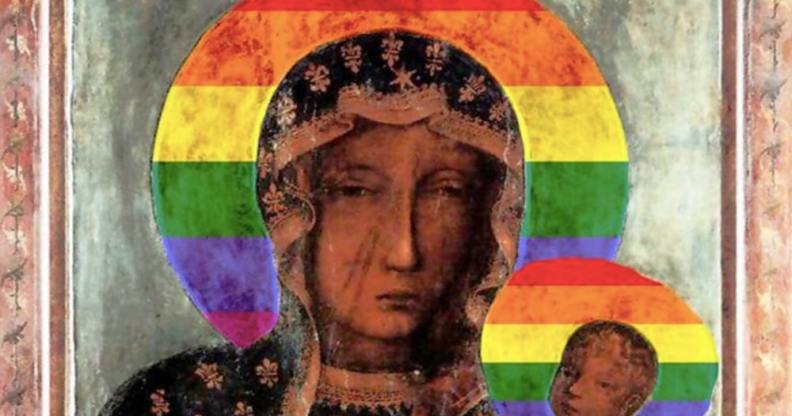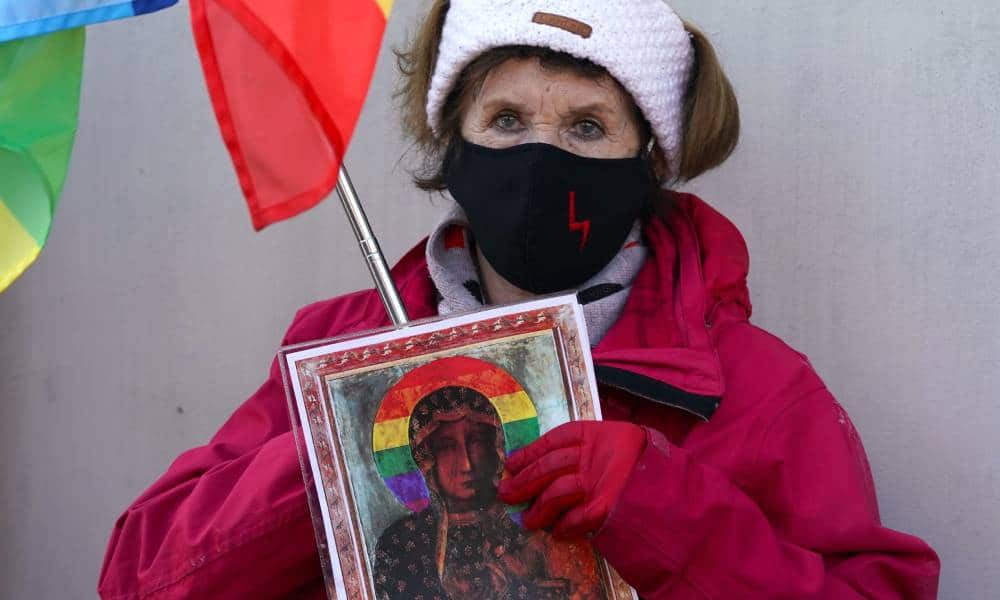Court rejects ‘ugly witch hunt’ of Polish activists over rainbow Virgin Mary posters

Image of the LGBT+ Virgin Mary circulated by Elżbieta Podleśna (Amnesty International)
Three LGBT+ activists in Poland have been acquitted once again of “offending religious beliefs” charges over posters of the Virgin Mary with a rainbow-coloured halo.
The posters were distributed in the city of Płock in 2019 to protest increasing anti-LGBT+ hostility from Poland’s influential Catholic Church, which has close ties with the right-wing government.
The three women responsible – identified as Elżbieta, Anna and Joanna – faced a potential two-year jail sentence each if found guilty for their peaceful activism. In March last year they were acquitted, but prosecutors appealed that decision.
On Wednesday (12 January), a court dismissed the appeal, according to Amnesty International.
Catrinel Motoc, Amnesty International’s senior Europe campaigner, said the decision is a “huge relief” but didn’t “disguise the fact that these three women should never have been put on trial in the first place”.
“Distributing posters of the Virgin Mary wearing a rainbow halo should never be criminalised, so it is right that the appeal against their acquittal was rejected,” Motoc said.
She continued: “Since the start of the case against them, more than a quarter of a million people have spoken out to demand that the authorities drop the charges in a case that has come to symbolise some of Poland’s most disturbing anti-human rights trends.
“Not only is space for free expression, activism and peaceful protest shrinking, but the climate of homophobia in the country is worsening amid an increase in hate crimes, the introduction of ‘LGBTI-free’ zones by local councils and attempts to ban Pride marches.”
Motoc added that the case has “revealed an ugly seam of state-sponsored homophobia”. She claimed it had also exposed how Poland’s criminal justice system is “being used to target, intimidate and harass human rights defenders simply because of their activism”.
“The Polish authorities must finally end their witch-hunt against these and other activists,” she said.
Another human rights win! We are going to celebrate this now. Thank you all for your support. pic.twitter.com/Vl8kH32uLu
— Amnesty Polska (@amnestyPL) January 12, 2022
The prosecutors argued at the appeal hearing that the first court was not critical enough of the women’s actions, according to a live Twitter feed from the Polish branch of Amnesty International.
They argued that the Virgin Mary is an “important symbol for Catholics and not for atheists and others” and that the trio “knew about that”.
Elżbieta, one of the three activists on trial, argued before the court that “homosexuality is no longer on the list of mental disorders” so what is “happening in this court is against science and dignity”, according to Amnesty Polska’s tweets.
“It’s a scandal for me,” she said. “I don’t want that [phobias] and [prejudices] were present in public discourse or even dominant.”
She continued: “Christian community in Poland, Catholic community, is not homogenous. What you represent is the extreme part of it.
“You have ambitions to change the law, to punish those who will not allow that. Poland is [a] secular state”.
"Christian community in Poland, Catholic community, is not homogenous. What you represent is the extreme part of it. You have ambitions to change the law, to punish those, who will not allow that. Poland is secular state".— Amnesty Polska (@amnestyPL) January 12, 2022
Anna told the court that their continued fight for LGBT+ rights in Poland has garnered worldwide attention, saying the “world has heard us and heard our battle”.
“You will not take away anything but air because it’s more and more difficult to breathe freely in Poland,” she said.
She added that the LGBT+ community are “not protected by the state” and said there is “no such thing as [a] hate crime based on sexual orientation”.
According to Amnesty Polska, the judge in the case had “objections to the quality of the appeal” and ultimately dismissed it.
He also underlined the “importance of objectivity in such proceedings” and the need for “equal access to the public space by all sides”.
Rainbow Virgin Mary case intensifies spotlight on LGBT+ rights in Poland.
Poland has faced increasing global scrutiny after nearly 100 municipal or local governments, nearly a third of the country, proclaimed themselves to be “free from LGBTI ideology”.
LGBT+ rights in Poland were already few and far between. Discrimination protections only (theoretically) exist within employment, the country has not legalised equal marriage, and same-sex couples are unable to adopt or undergo IVF in Poland.
Poland’s parliament is also debating on a “LGBT+ propaganda” law similar to those seen in Hungary and Russia. The lower house of the country’s parliament is set to debate the bill on Tuesday (12 January).
The reform, dubbed “Lex Czarnek” or “Czarnek’s Law”, would give school superintendent the power to veto any teaching materials provided by charities or other outside organisations. The superintendents would also be able to dismiss headteachers without notice if they don’t comply.

Supporters of Polish LGBT+ activists hold a picture of Virgin Mary with a rainbow halo, in front of the court in Plock, Poland, on 2 March 2021. (Getty/Janek Skarzynski/AFP)
The European Parliament has declared the EU an “LGBTIQ freedom zone” in symbolic protest against the discriminatory policies promoted in Poland.
The European Commission, the executive arm of the EU, announced in July that it would be bringing legal action against Poland over its anti-LGBT+ laws.
The commission said Poland will face action after it “failed to fully and appropriately respond to its inquiry regarding the nature and impact of the so-called ‘LGBT-ideology free zones’”.
The EU officials believed these declarations potentially violated the EU’s law regarding non-discrimination due to sexual orientation.

